The theory that Western individualism spread from the prohibition of close family marriage is proposed

By
Associate professor of economics at George Mason University is the theory that the prohibition of close family marriage by Christianity has greatly changed the behavior and thinking of Catholics, especially in Western Europe, and increased individualistic thinking Advocated by Jonathan Schulz and others.
The Church, intensive kinship, and global psychological variation | Science
https://science.sciencemag.org/content/366/6466/eaau5141
Western Individualism Arose from Incest Taboo-Scientific American
https://www.scientificamerican.com/article/western-individualism-arose-from-incest-taboo/
Schultz et al. Investigated the relationship between Christianity and kinship in Western Europe based on anthropology, psychology, and history. While loyalty increased, it turned out that the relationship of trust, equality, independence, and analytical thinking with other bloodless people tend to be impaired.
Schultz advocates that the Western Church, which bans close marriage, wiped out the nation and society built by close marriage. As a result, the increase in the number of nuclear families, moving people, and individualism, and the decline in family relations and collaboration led to the values that characterize Western Europe.
The following three graphs analyze Spearman 's relationship with the ratio of close marriage to marriage (relative marriage rate), the number of years affected by Christianity, and individualism. The blue dots indicate the countries affected by the Western Church, the green diamonds indicate the countries affected by the Eastern Church , and the gray triangles indicate the countries where Christian influence is weak.
From the graph showing the relationship between the number of years affected by Christianity (horizontal axis) and the relative marriage rate (vertical axis), the relative marriage rate is lower in countries where the teachings of the Western Church have lasted longer. I understand.
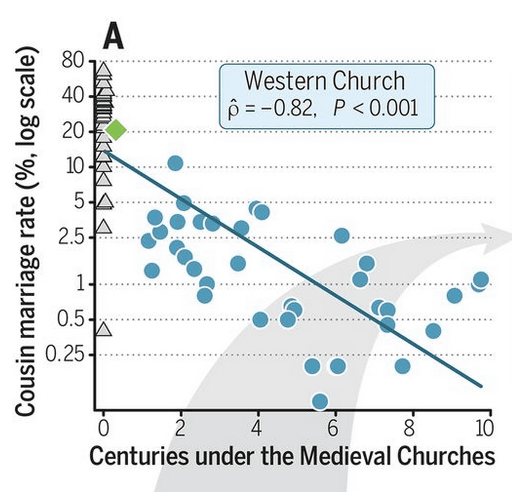
The graph below shows the relationship between the intimate marriage rate (horizontal axis) and individualistic trends (vertical axis), and you can see that individualistic social psychology can be seen in countries with low relative marriage rates. .
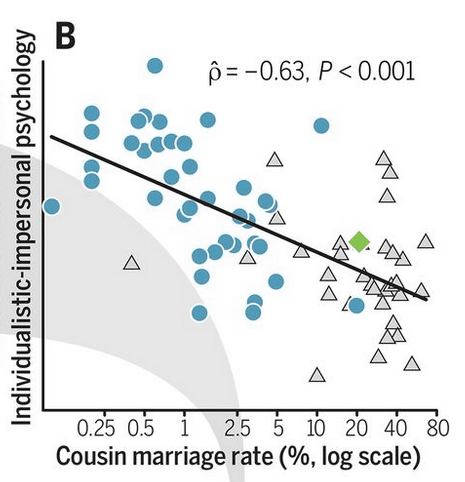
If you look at the graph of years (horizontal axis) and individualistic psychological tendencies (vertical axis) under the influence of Christianity, the country where the teachings of the Western Church are rooted is more than the country where the teachings of the Eastern Church are rooted You can also see that there is an individualistic psychological tendency.
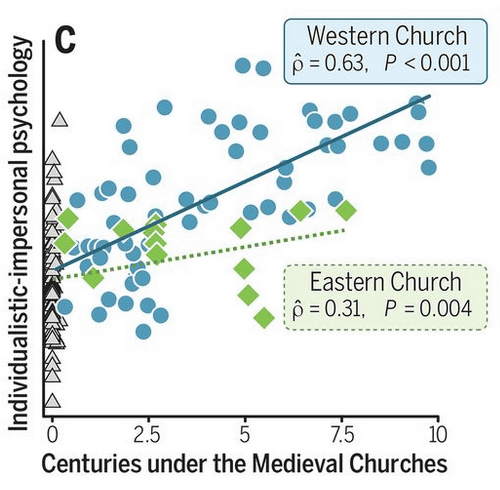
Joseph Henrich, a professor of human evolutionary biology at Harvard University, argues that the change of the European family to a monogamous nuclear family from around 500 C.E. The
Based on the spread of Christianity from 550 AD to 1500 AD, the following figure shows that the darker the color, the more influenced by the church. Blue represents a country with a strong influence from the Western Church, and green represents a country with a strong influence from the Eastern Church. The orange line drawn in the enlarged European map in the lower left shows the border between the Caroling Empire and the pink line shows the border between Western and Eastern Europe.
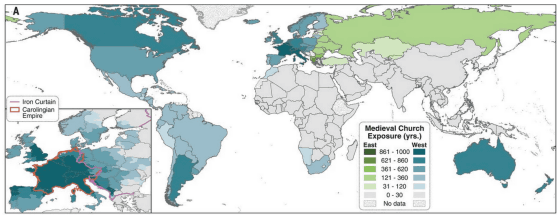
The graph below shows the relationship between a country that has been influenced by the church for a long time (horizontal axis) and the psychological scale of individualism (vertical axis). Blue dots and solid lines indicate western churches, green diamonds and dashed lines indicate countries where eastern churches have a strong influence. The triangle is a country where the influence of the Christian Church is small (Christianity has spread and has been under 30 years).
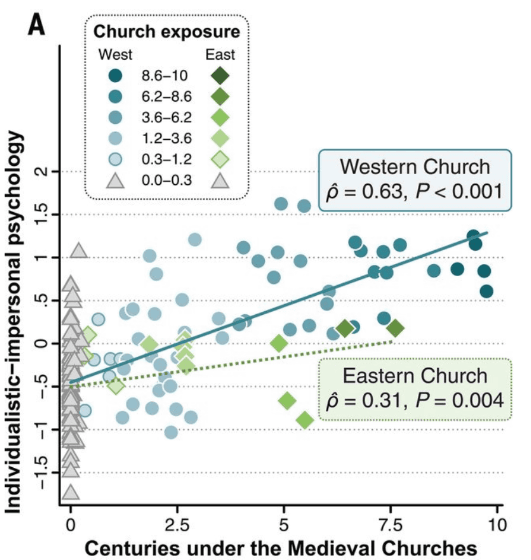
The following figure shows the Kinetic Strength Index (KII), which determines the strength of kinship based on the ethnic language groups and relatives of the world, polygamy, etc.
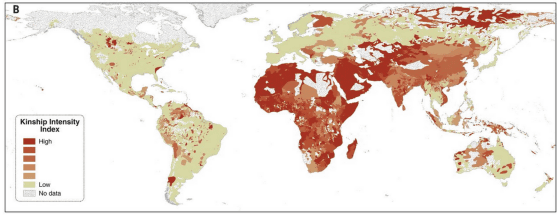
The graph below shows the relationship between KII (horizontal axis) and individualistic psychological scale (vertical axis). It can be seen from the graph that KII is lower in countries where Christianity is deeply rooted. The deeper roots of Christianity have a higher individualistic psychological tendency, indicating that countries affected by the Western Church are more individualistic than the Eastern Church.
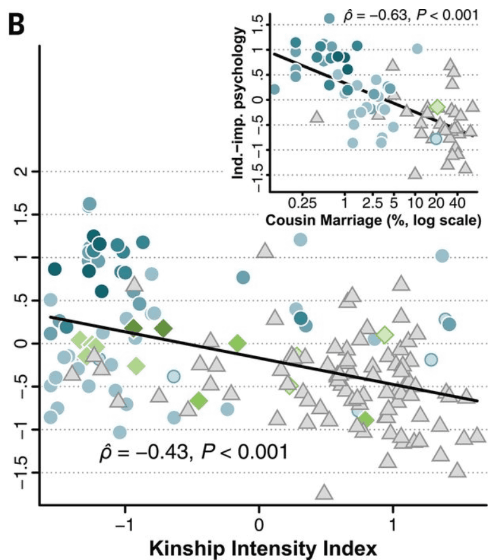
The following graphs were investigated for each region in Europe. The purple triangle represents Spain, the red square represents France, the green dot represents Italy, and the blue diamond represents Turkey. Looking at the graph that shows the relationship between the relative marriage rate (horizontal axis) and the individualistic psychological scale (vertical axis), in addition to Spain and Italy, France has a low relative marriage rate and is individualistic. In contrast, Turkey with a high relative marriage rate is totalitarian .
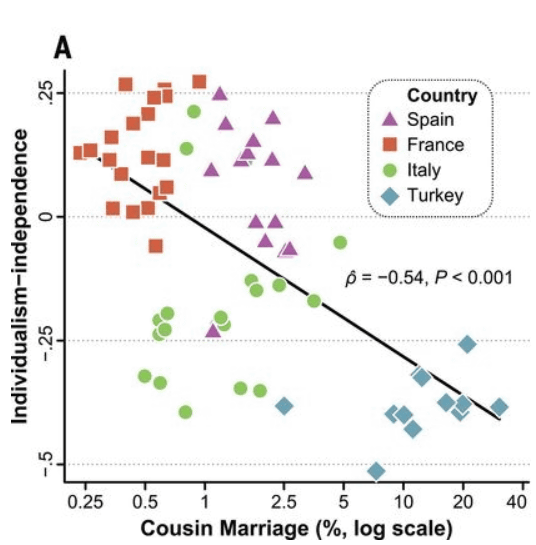
The graph that shows the relationship between the relative marriage rate (horizontal axis) and cooperativity and obedience (vertical axis) also shows that France, which has a low relative marriage rate, has the lowest coordination and obedience. Turkey is the exact opposite and is more cooperative and compliant.
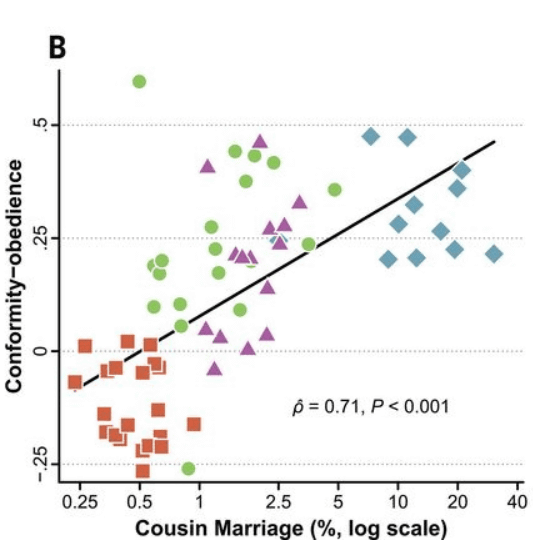
Looking at the graph showing the relationship between relatives (horizontal axis) and fairness (vertical axis), France is more fair and Turkey is lower.
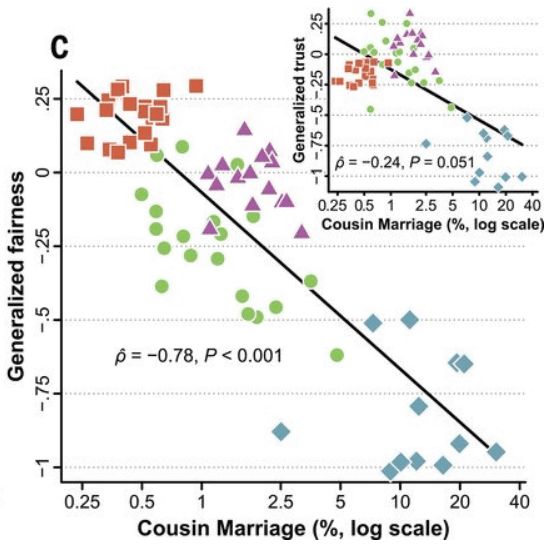
Spain, France, and Italy, where the influence of the Western Church is strong, tend to be individualistic and impartial, with low relatives, coherence, and obedience, and the values shown by France are particularly remarkable. In contrast, Turkey, which has a strong influence from the Eastern Church, has a high relative marriage rate and low individualism, which is the opposite of France.
Mr. Schulz also states that 'prohibiting close marriage may have encouraged Christian growth.' I suppose that the ban on close marriage led to the elimination of customs and beliefs shared by each relative, which made it easier for people to convert.
On Schultz's study of Christian psychological changes in Western Europe, Thomas Tarhelm, associate professor of behavioral science at the University of Chicago, said, “Because few people focused on Christians and the nuclear family, It ’s an interdisciplinary study. ” However, the theory of human culture has regional exceptions and unique cases, so we anticipate that some will oppose the relationship between close marriage and individualism. “Some researchers are deeply wary of the generalization of theory and theories of large scale, but that caution can overlook the usefulness of the theory and the consistency of discovery.” The
Related Posts:
in Note, Posted by darkhorse_log







